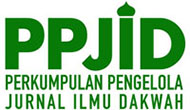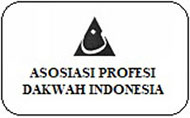Bibliometric Analysis of the Radio Da'wah Research
Abstract
This research aims to understand the research trends in radio da'wah, identify relationships between scientific concepts, and determine the radio da'wah science network based on keywords and author collaboration. The method used in this research is descriptive bibliometric analysis, and the data used was taken from 2013-2023. Data was collected from the Scopus and Google Scholar databases with the keyword da'wah radio. Data collection was carried out using Publish or Perish software as metadata. Data analysis was carried out using Vosviewer software as a bibliometric analysis medium. The research results show that da'wah radio publications experience fluctuating development, with Scopus publications being very low. Meanwhile, publications in nationally accredited journals and national journals have increased significantly. From the visualization Vosviewer, it can be seen that Islamic institutions or universities dominate research on radio da'wah.
Keywords
Full Text:
PDFReferences
Abdelfattah, H. A. (2021). The Ibtihalat in the digital age: Public and private domains. Religions, 12(10). https://doi.org/10.3390/rel12100866
Achmad, Z. A., Ida, R., Mustain, & Lukens-Bull, R. (2021). The synergy of islamic da’wah and madura culture programmes on nada FM sumenep radio, Indonesia. Jurnal Komunikasi: Malaysian Journal of Communication, 37(2), 111–129. https://doi.org/10.17576/JKMJC-2021-3702-08
Ahmad, N. (2017). Problematika Dakwahtainment Di Media Dakwah. AT-TABSYIR: Jurnal Komunikasi Penyiaran Islam, 5(2), 229–250. https://doi.org/10.21043/at-tabsyir.v5i2.3375
Ali, R. (2019). Imagined Community of Radio. Journal of South Asian Studies, 7(2), 29–37. https://doi.org/10.33687/jsas.007.02.2757
Amar, B. R., Mulyana, D., Bajari, A., & Rizal, E. (2019). Information management using intelligence media management (IMM) digital media analysts in managing the reputation of the Indonesian national police. Journal of Theoretical and Applied Information Technology, 97(20), 2306–2321.
Astuti, B., & Harliantara, H. (2021). Radio in the Convergence Era: A Case Study of Bravos Digital Radio. https://doi.org/10.4108/eai.16-10-2019.2304283
Efendi, Z. (2021). Komunikasi penyiaran dakwah dalam sejarah islamisasi di daerah perbatasan Indonesia-Malaysia pada masa kerajaan. Islamic Communication Journal, 6(2), 233–249. https://doi.org/10.21580/icj.2021.6.2.7527
Humaizi. (2018). The correlation between broadcasting spill-over of Malaysian television and radio on Islamic religious knowledge of community members in east aceh. Jurnal Komunikasi: Malaysian Journal of Communication, 34(1), 202–217. https://doi.org/10.17576/JKMJC-2018-3401-12
Innayah. (2017). Streaming Radio Education: Facilitating People to Educate themselves. Jurnal Teknodik, 21, No. 2. https://doi.org/http://dx.doi.org/10.32550/teknodik.v21i2.285
Ismandianto, I., Suyanto, S., Latifah, K., & Muchid, M. (2022). Transformation of Radio Technology in The Digital Age. Nyimak: Journal of Communication, 6(1), 115. https://doi.org/10.31000/nyimak.v6i1.5547
Karakus, M., Ersozlu, A., & Clark, A. C. (2019). Augmented reality research in education: A bibliometric study. Eurasia Journal of Mathematics, Science and Technology Education, 15(10). https://doi.org/10.29333/ejmste/103904
Lathifah, K. (2021). Radio Convergence in Maintaining Existence in the Digital Era and Covid-19. Jurnal Riset Komunikasi, 4(1), 130–142. https://doi.org/10.38194/jurkom.v4i1.215
Masduki, Muzakki, A., Rosidi, I., & Hartono, T. (2022). Islam on the air: the struggle for Salafism through radio in Indonesia. Indonesian Journal of Islam and Muslim Societies, 12(1), 59–84. https://doi.org/10.18326/ijims.v12i1.59-84
Nasution, F. (2012). Radio Komunitas Sebagai Media Dakwah. HIKMAH: Jurnal Ilmu Dakwah Dan Komunikasi Islam, 6(1), 42–57. http://repo.iain-padangsidimpuan.ac.id/id/eprint/206
Nawawi, Zaim, M. A., Ibrahimy, A. A., Yasid, & Achak, A. H. (2023). Islamic Law at the Grassroot; SIGMA Program at Bhasa Radio Situbondo and Its Controversy. Al-Ihkam: Jurnal Hukum Dan Pranata Sosial, 18(1), 224–247. https://doi.org/10.19105/al-lhkam.v18i1.8332
Neel, J. O., Reed, J. H., & Gilles, R. P. (2004). Convergence of cognitive radio networks. 2004 IEEE Wireless Communications and Networking Conference, WCNC 2004, 4, 2250–2255. https://doi.org/10.1109/wcnc.2004.1311438
Rahayu, T. Y., & Dewi Katili, K. R. (2019). Radio Program Strategy in Maintaining Its Existence. Makna (Journal of Communication, Language, and Culture Studies), 4(1), 139–153. https://doi.org/10.33558/makna.v4i1.1677
S Kholil. (2021). Teori Komunikasi Massa. iptapustaka Media.
Shah, Q. A., Nawab, B., Nyborg, I., & Elahi, N. (2020). The narrative of militancy in Swat, Pakistan. Journal of Human Security, 16(2), 55–65. https://doi.org/10.12924/johs2020.16020055
Sikumbang, A. T. (2024). Digital Da ’ wah Indonesia Ulema in the Discourse of Theology. 105(1), 1–14. https://doi.org/Universitas Sumatera Utara, Indonesia https://orhttps://doi.org/10.46222/pharosjot.1051
Sikumbang, A. T., & Siahaan, R. F. U. (2020). Youtube As a Da’Wah Media. Jurnal Al-Bayan: Media Kajian Dan Pengembangan Ilmu Dakwah, 26(2), 304–322.
Sunarwoto. (2016). Salafi Dakwah Radio: A Contest for Religious Authority. Archipel, 91, 203–230. https://doi.org/10.4000/archipel.314
Sunarwoto, S. (2021). Radio Fatwa: Islamic Tanya-Jawab Programmes on Radio Dakwah. Al-Jami’ah: Journal of Islamic Studies, 50(2), 239–278. https://doi.org/10.14421/ajis.2012.502.239-278
Tarmawan, I., Rusdiyana, R., Salim, A. D. P., & Ulpah, A. P. (2021). The Role of Podcasts as an Alternative Media for Learning and Distribution of Audio Based Content. International Journal of Research and Applied Technology, 1(1), 1–8. https://doi.org/10.34010/injuratech.v1i1.5453
van Eck, N. J., & Waltman, L. (2010). Software survey: VOSviewer, a computer program for bibliometric mapping. Scientometrics, 84(2), 523–538. https://doi.org/10.1007/s11192-009-0146-3
van Eck, N. J., & Waltman, L. (2014). Visualizing Bibliometric Networks. In Measuring Scholarly Impact. https://doi.org/10.1007/978-3-319-10377-8_13
Vincent, A. (2021). Mediamorphosis of Radio Broadcasting on a Drive-in Concert Event during Pandemic Era. Industry and Higher Education, 3(1), 1689–1699. http://jurnal.umt.ac.id/index.php/nyimak/article/view/4806/2725
Zahra, A. A., Nurmandi, A., Tenorio, C. B., Rahayu, R., Benectitos, S. H., Mina, F. L. P., & Haictin, K. M. (2021). Bibliometric analysis of trends in theory-related policy publications. Emerging Science Journal, 5(1), 96–110. https://doi.org/10.28991/ESJ-2021-01261
Zakiyyah, F. N., Winoto, Y., & Rohanda, R. (2022). Bibliometric mapping of the development of information architecture research on Google Scholar using VOSviewer. Informatio: Journal of Library and Information Science, 2(1), 43. https://doi.org/10.24198/inf.v2i1.37766
DOI: http://dx.doi.org/10.24014/jdr.v35i1.28927
Refbacks
- There are currently no refbacks.

This work is licensed under a Creative Commons Attribution-ShareAlike 4.0 International License.
Editorial Office:
2nd Floor, Building of Faculty of Da'wah and Communication, Universitas Islam Negeri Sultan Syarif Kasim Riau. Jl. HR Soebrantas Km 15, Simpangbaru, Tampan, Pekanbaru
Email : jurnalrisalah@uin-suska.ac.id

This work is licensed under a Creative Commons Attribution-ShareAlike 4.0 International License.














